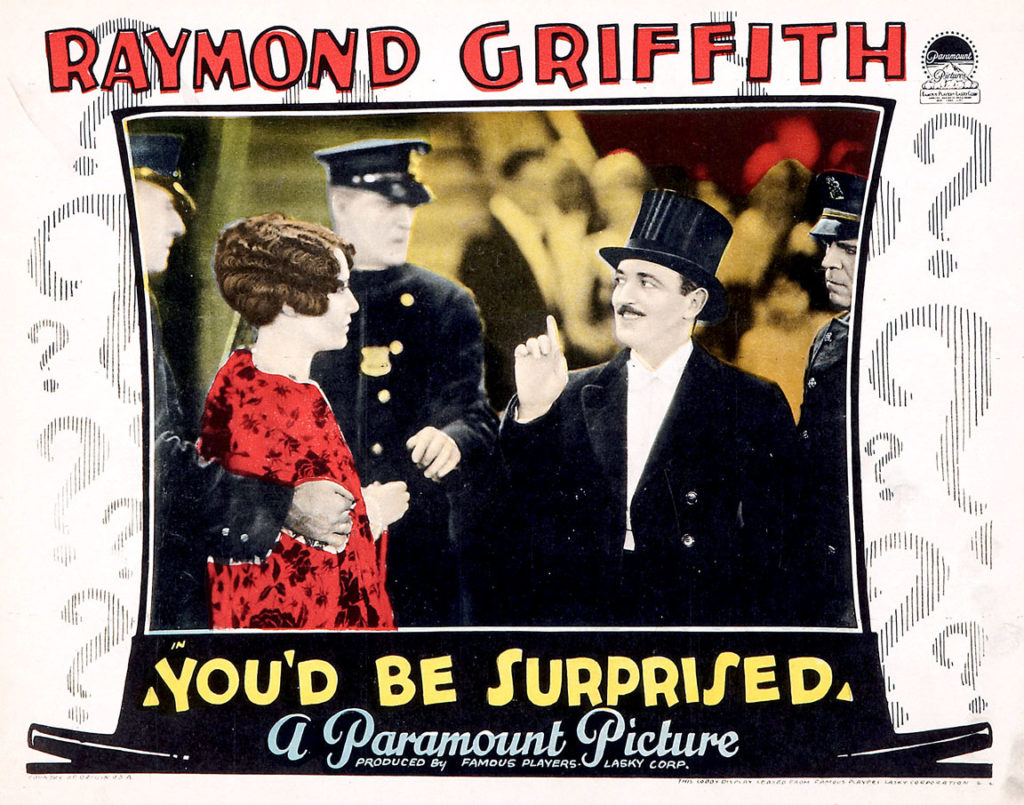The Raymond Griffith comedy You’d Be Surprised (1926) is not as well-known as his other starring features. That’s not saying much, given that most classic film fans don’t know Raymond Griffith and that most of his films are lost.This one deserves a better reputation, but I get why it’s not on the tiny hit parade of Griffith comedies.
After spending nearly a decade in front of and behind the camera, Raymond Griffith rose to stardom in silents around 1925, and starred in about a dozen comedy features in the three years that encompass 1925-27. The tally varies depending on which of the earlier titles are films one considers him a star in even if he’s not billed that way in the credits. There are a few 1924-25 features that he practically steals.
Hands Up! (1926) and Paths To Paradise (1925) are the two films most-often mentioned and screened. Championed by both Walter Kerr and William K. Everson in the 1970s, Griffith’s tuxedoed unflappable comic hero engages in both character-driven comedy and physical gag sequences and chases in these two films, one of which is on the National Film Registry.

You’d Be Surprised is an unusual film, especially for a comedy feature of 1926. It takes place entirely in one setting, a small ocean liner. There is something about the film that, on the surface, seems like it was based on a stage play. It relies a little more heartily on its dialog, as any whodunnit mystery must, and again there’s the single location thing. I know I was fooled.
I checked. You’d Be Surprised is not based on a play. It’s an original scenario, and with titles written by both Robert Benchley and Ralph Spence. It doesn’t feel or flow the way a stage-adapted silent film does. There are usually tell-tale signs, like extended dialog sequences done through titles where little information is given to us visually. Surprised, however, balances the dialog and intrigue with sight gags and rarely if ever feels like it was ever a stage play.
The clue for me is that there are a number of gags that could not work in a stage property, gags upon which the plot makes some of its more important twists. There is a running gag that involves the old “I’m going to turn off the lights and count to three, and then turn them back on” routine. In each instance, what occurs in the blackout could only take place in a silent film, rooted in the abilities silent film has to play with audio and time.
In these blackouts, and in a few other moments when people are out of the main room of the film’s story, things occur which the audience does not hear and which must make noise that all the characters should hear. These same events do not happen in real time, but which in a stage production would have to.
This could never have been a stage property, even though it may look it, and is as clever and funny as Griffith’s other surviving comedies, even if it isn’t — on the surface — as “cinematic” as Hands Up! and Paths To Paradise are.
The Library of Congress has an excellent and bookable 35mm print of You’d Be Surprised. I’ll be presenting and accompanying it on theatre organ at the Library’s Packard Campus Theater in Culpeper VA on Sat August 17, 2019 at 2:00.